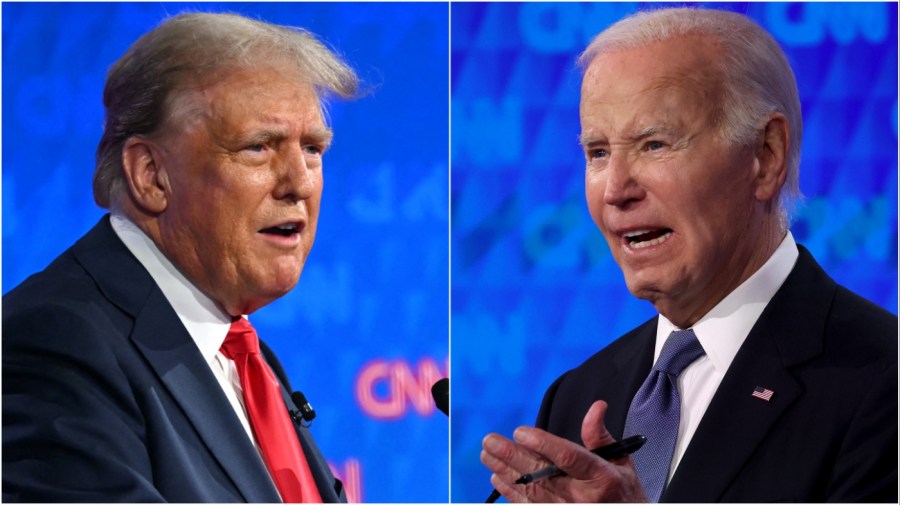(NewsNation) — The square-off between President Joe Biden and former President Donald Trump in the first presidential debate turned the election on its head, leading Biden to eventually bow out and endorse Vice President Kamala Harris in his place.
Presidential debates have long been utilized as forums where voters can see candidates interact and think on their feet, but none appears to have been as consequential in shaping the election as the one between Biden and Trump.
After a disastrous performance in the face-off where Biden appeared to mumble and trail off at times, the Democratic party lost confidence in his ability to campaign and pushed for him to step down.
Harris, the likely Democratic nominee, said she’s “ready to go” for a debate with Trump. His campaign has said he may not want to participate in an event hosted by ABC News, as previously planned.
Trump told reporters that he would “absolutely” debate Harris at least once before Election Day, but his campaign said it couldn’t agree to one “until Democrats formally decide on their nominee.”
Do presidential debates impact an election outcome?
Historically, research has suggested that presidential debates have a negligible effect on outcomes, but they do drive other factors that could affect ballots, Aaron Kall, director of debate at the University of Michigan, told NewsNation prior to the first debate between Trump and Biden.
“Even if it doesn’t move the needle very much, debates have the ability to potentially shift enough undecided voters to have a big impact, and if not the debate itself, the debate then drives future media cycles, fundraising and other things that has the cumulative big effect on some low-information or undecided voters,” he said.
For the most part, people tune into the debates already having made their choice and cheer on their preferred candidate almost the way they would their favorite sports team, he said.
According to post-election surveys from 1988 through 2016 conducted by the Pew Research Center, while voters found the debates useful, they did not find them necessarily determinative.
The results were similar in a widely cited study published in the Quarterly Journal of Economics in 2023, which found that debates “neither increase individual vote choice consistency nor reduce the distance to final vote shares,” adding that they, in fact, “move a small fraction of voters away from their final vote choice, in the short term.”

That’s not to say debates don’t serve a purpose, Kall said, adding debates can have more of an impact when candidates are polling close.
What’s the purpose of presidential debates?
Debates are also an essential part of the democratic process, said Ed Lee III, who served as the senior director for debate deliberation and dialogue at Emory University.
“This is one of the few times in which we can find people who have different sets of policy preferences and choices coming together to talk about those, and they can serve to normalize that as a part of democratic discourse,” Lee told NewsNation prior to the first debate.
He said that even though debates themselves may not significantly affect election outcomes, their impact is most visible in the “magnification of what happens through the news media,” which does affect polls.
“I don’t think that it’s always directly based upon what gets said at that immediate moment, but a lot of times in the way in which the media presents who won and who lost,” Lee said.
But more importantly, he said, “debates have the possibility of transforming the candidates into acceptable political actors for those who disagree with them.”
During debates, candidates “try to figure out how to communicate a set of arguments that are acceptable for a broad swath of the American society and so it tends to normalize the candidates in the eyes of those who disagree with them and it makes the transition from one party to the other a little easier.”
Have presidential debates impacted election outcomes in the past?
The first debate between Biden and Trump had its biggest impact on an election cycle thus far, eventually leading to the sitting president deciding to drop out of the race.
There have also been other points where they’ve helped shape election outcomes, according to political experts.
Former President Jimmy Carter ultimately defeated then-sitting President Gerald Ford in the 1976 presidential election, and many attribute the loss in part to Ford appearing ill-prepared when he erroneously said there was no Soviet domination in Eastern Europe during a presidential debate, Kall said.
In 1984, former President Ronald Reagan addressed his older age — which was viewed negatively — in the first debate against Walter Mondale by telling a joke about his opponent being too young, which many say helped smooth over the narrative against him. He went on to win in a landslide.
Kall said much of the public and media focused on Al Gore’s “quirky nonverbal sighs and shrugs” when he debated George W. Bush in 2000, even though the former vice president performed better substantively.
“George W. Bush got a lot of mileage out of those debates and ended up winning a really close election,” he said.
In 2020, Biden took a 13-point lead ahead of Trump after their first debate and until just a few days before the second, according to an NBC/Wall Street Journal poll. While it’s not completely clear exactly what attributed to the leap, political pundits at the time widely said Biden was the clear winner in the verbal spar.





